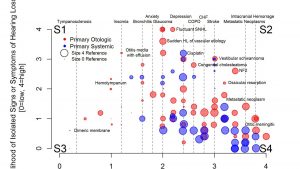
Hearing loss is incredibly prevalent, with one-in-three adults over the age of 65 suffering from disabling hearing loss, and even larger numbers experiencing mild or moderate loss. Along with collaborators at Northwestern University, University of Texas and the Mayo Clinic we are investigating health care for this growing population of individuals with hearing loss. We are seeking to improve access to care by removing barriers to entry, such as the medical waiver needed to purchase a hearing aid. Furthermore, we are developing research that will address the gaps in knowledge about hearing health care, focusing particularly on unrecognized barriers to care and the costs associated with the ongoing epidemic of hearing loss.
Funded by NIH/NIDCD
- Klyn, NAM, Letendre, C, Shrestha, N, Lambert, BL, Dhar, S(2021)Interpretability of the audiogram by audiologists and physician non-specialists. Int J Audiol 60 (2):133-139.
- Klyn, NAM et al.(2019)CEDRA: A Tool to Help Consumers Assess Risk for Ear Disease. Ear Hear 40 (6):1261-1266.
- Kleindienst, SJ et al.(2018)Errors in Items and Algorithm in Questionnaire Used in Validation Study. JAMA Otolaryngol Head Neck Surg 144 (5):462.
- Klyn, NAM et al.(2018)A Retrospective Estimate of Ear Disease Detection Using the "Red Flags" in a Clinical Sample. Ear Hear 39 (5):1035-1038.
- Kleindienst, SJ et al.(2017)Development and Initial Validation of a Consumer Questionnaire to Predict the Presence of Ear Disease. JAMA Otolaryngol Head Neck Surg 143 (10):983-989.
- Kleindienst, SJ et al.(2016)Identifying and Prioritizing Diseases Important for Detection in Adult Hearing Health Care. Am J Audiol 25 (3):224-31.
Search PubMed

